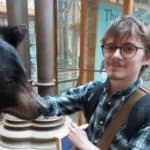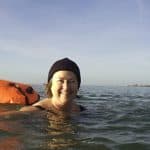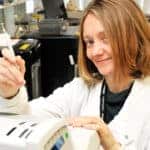-
Asked by drew1raw on 23 Apr 2024.0
-
Rachel Edwards answered on 23 Apr 2024:
It has changed over time. I started off working on other people’s projects and learning how to do experiments, how to analyse data, and how to come up with my own ideas – contributing my own thoughts and directions to the project, but helped out by someone else. It’s a bit like learning to ride a bike – you start with a lot of support, move to riding without stabilisers but with someone holding on, and eventually you’re on your own. Now, I lead my own research group, so I come up with lots of initial ideas, do some preliminary experiments, and then get PhD students and other researchers involved. I love when they start coming up with ideas and deciding where the research should go next, and it becomes their research.
-
-
Alexander De Bruin answered on 23 Apr 2024:
I’ve got a similar story to Rachel. I started off doing research work that was assigned to me. I then started suggesting my own topics and went looking for inspiration and problems to solve. I now help my team come up with their own topics and act as the champion for their ideas and their results to make sure the best ideas get implemented and recognised.
-
Rebecca von Hellfeld answered on 23 Apr 2024:
I have been lucky to be involved in many projects where I got to be part of coming up with new ideas, developing the approach and looking at how to answer questions, and even doing the research itself. You dont necessarily have to do that though. I have colleagues who love to come up with projects but will find researchers to do the work once itscomes to that part. Others prefer to only do the hands on research and dont want to be involved in coming up with the ideas and planning everything.
-
Michael Schubert answered on 24 Apr 2024:
When I began working in science, I worked in a lab where more senior scientists told me what to do and why and I did it. That means I made my own discoveries, but they came almost entirely from other people’s ideas because I didn’t know enough about research yet to come up with my own.
Later on, I began coming up with smaller ideas to explore alongside the big ones that were assigned to me. Eventually, during my PhD, I began to develop ideas of my own to explore (although I still worked on big projects that the professor in charge of the lab came up with as well).
Nowadays, I develop and carry out research ideas myself, pass them on to other researchers, or even make the questions public so that anyone who wants to can take up the challenge. I work a lot in science communication, which means that I’m also involved in coming up with a lot of journalistic ideas, researching them, and carrying them out. Not that dissimilar to lab science!
-
Martin McCoustra answered on 26 Apr 2024:
One of the most important things to me as an academic is that I get to choose the direction of my research. I’ve done that since my first academic position in 1988. That doesn’t mean to say that my first direction is the one I’ve stuck to… I’ve tweaked it as time has progressed and I’ve learn more things. In that, I get the chance to influence my research students and staff in their development. That is an important goal for me as an educator as well as a researcher.
-
Emilia Arguello answered on 30 Apr 2024:
This will vary a lot depending on the kind of scientist you ask, what sector they work in, and what stage of their career they are in.
In academia, for most scientists I’ve met, the beginning of their careers involves more hands-on research and direct efforts to gather data (for instance, conducting experiments in the lab, gathering data in the field, interviewing people, analyzing large datasets, etc), usually under the guidance of a supervisor (e.g. a group leader/professor at an institute or university) who defines the main research ideas and visions.
The more experience you gain, the more you also start defining your own interests and thinking about original research ideas of your own, thinking about the big picture, communicating your science, forging and maintaining collaborations, looking for funding, and learning how to manage and mentor more junior scientists. You become more independent and start establishing your own research vision. Scientists in industry (for instance, at a pharma company) might also follow a similar path but have a bit less flexibility as they must adhere to whatever the mission and vision the company the company they’re working for has. This is not necessarily a bad thing, though. Different people thrive in different environments.
In my personal experience, I started doing research in chemistry as an undergraduate and then continued with a Ph.D, essentially doing lots of experiments in the lab and following a broad research direction set by my supervisors. As I progressed in my Ph.D., I started thinking more about how to think more like a scientist, i.e., how to think of hypotheses and new ideas, how to design better experiments to get the data we need, how best to interpret and present those data, how to change directions if projects aren’t going that well, and how to think more about where my research fits in the bigger picture. Now, as a postdoc researcher, I continue doing that, but even with more independence! I really like the balance of hands-on technical work and more hands-off conceptual thinking in my work so far!
-
Sophie Shaw answered on 30 Apr 2024:
My job title is “Lead Bioinformatician for Research and Development”. This means that I try and bring research into the NHS to try and ensure that patients are getting genetic tests at the forefront of science. I think that’s pretty cool!
-
Neil Barnby answered on 2 May 2024:
My research is usually done my others, specifically user researchers. My part in the development is to analyse that research and develop insights from it. This gives us user needs and user stories that then allow us to develop AI systems that are user led.
This is very different type of research to what you would imagine traditional scientists to do but it is what most in the digital industry do.
-
Martha Mulongo answered on 3 May 2024:
I started work in the sense that I was in the lab but would follow what my boss would tell me to do and would never think outside the box.
When I was starting my current job, I did not really have a clear scope of what to do. After going through trainings, I am now able to have a wider understanding and perspective of what I do. I am now involved in the planning and execution of the experiments in the lab. I am involved in adjusting protocols which is really cool. -
Sarah-Jane Potts answered on 17 May 2024:
I have been lucky to have a lot of opportunities to do this. During my engineering doctorate project, I was able to spot a gap in the scientific understanding and proposed that I could design and make a new piece of equipment that would provide experiments to proove/dissprove the theories. I was successful in designing, making and using the equipment and it has now been used lots of times. In my post-doctoral research job, I was able to plan experiements using this equipment to improve how well my printed solar pannels work.
-
Paul Dove answered on 26 May 2024:
I have been lucky enough to get involved in developing new products for consumers all of my career. My research and the work I did leading teams was to identify ways to make life better for the users, consumers and society I live in. I have been lucky enough to be able to develop safe drug products that help Irritable Bowel Syndrome, made people smell amazing with great fragrances for brands like Hugo Boss, create new flavours of Quaker Oats, make sure that the oranges going into your Tropicana are the best you can taste, make great tasting cider and low alcohol beer, and finally to make tissues and toilet rolls that are the softest and strongest you can buy. As you can tell I worked in making consumer products and had a great time and career….always asking the question, how do we make this better?
-
Kirsty Lindsay answered on 10 Jun 2024:
We are inventing a new piece of equipment to move our research forward- it’s really exciting!
-
Tamsin Dobson answered on 25 Jun 2024:
I was really lucky as I managed to develop and propose my own research for my PhD. This meant that for the 5 years of my PhD (which I did a bit part time), I was answering research questions that I had developed myself. This was amazing!!
Now I’m working for a company that will allow me to continue to develop these questions whilst also answering questions that come directly from industry.
As a research engineer, I love to answer research questions that are then immediately applied as engineering projects in the real work. So that’s perfect for me 🙂
-
Oznur Apsimon answered on 28 Jun 2024:
I did research for about 3.5 years on my doctoral studies developing a relativistic electron beam injector. Then, I had about 10 years post-doctoral research experience working on several projects developing accelerator technologies for future particle physics collider experiments. Now, I am a university lecturer. I teach electrodynamics and continue my research on developing particle accelerators to be used from particle physics experiments to medical applicatons.
-
David Bremner answered on 1 Jul 2024:
Being a technician i have more responsibility for running projects or analysis that has been derived from someone else coming up with an idea or question.
One cannot function without the other so we work together to bring the ideas to reality.
-
Amal Lavender answered on 2 Jul 2024:
This has varied across my career.
I started life as a manufactuirng engineer so my role was to understand the issue, work out the root cause and then provide this information to my research and development colleagues.
I would then work on the options with them to balance cost, time to implement, benefits to then trial the solutions on the production lines to see if they solved the problem.
Later, I’ve had roles where I am supporting the scientists to develop their ideas – either working to find funding, eliminate a barrier they were facing or reallocating or recruiting staff to help deliver the research. And now its improving the company processes and procedures to enable it to be easier for the scientists to advance their research.
Related Questions
How do you make new drugs
how to you deal with problems you come across when doing your research?
what motivates you to carry out your research?
do any animals get killed?
do you work on sex cells
What is the strangest disease one of your mouse models has helped a scientist understand ?
what is the most sucsesful piece of data you have found on how to keep astronauts safe in space?
You study bugs in particular and you have to love them to study them but if there is, is there any soft of bug that you
are there many women in your search
how do you make robots that can help in the cancer research?
Latest Questions
-
How do you make new drugs
-
how many plants do you study normally?
-
what happens when a person whos sick gets a DNA while the person is sick what do you do
-
What are polysaccharides?
-
how many nuclear explosions happen in the world
-
how does your job effect your daily life ? (2 Comments)
-
why does nuclear waste glow in the dark? (1 Comment)
-
how to you deal with problems you come across when doing your research? (2 Comments)
-
If you have been emotionally invested (focusing on anxiety if you suffer with it, dementia etc) do you find it
-
what motivates you to carry out your research? (1 Comment)
Latest Comments
-
how does your job effect your daily life ? (2 comments)
-
why does nuclear waste glow in the dark? (1 comment)
-
what motivates you to carry out your research? (1 comment)
-
how to you deal with problems you come across when doing your research? (2 comments)
-
How long have you been a scientist for (2 comments)







Comments